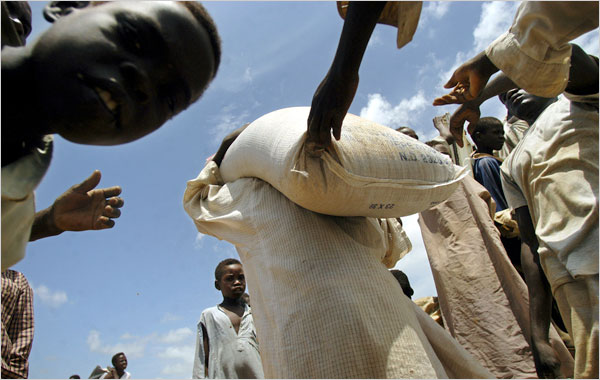So Much Food. So Much Hunger
- By Andrew Martin
The New York Times, Sept 19, 2009

DINNERTIME
Sudanese refugees unload bags of food at a camp in neighboring
Chad. The refugees had fled the violence in Darfur.
This past week the world celebrated the life and achievements
of Norman Borlaug, the Iowa-born plant scientist who created
high-yielding wheat varieties to stave off famine.
Dr. Borlaug, who died at age 95 on Sept. 12, led the so-called
Green Revolution that created bumper crops in once impoverished
countries like Mexico, India and Pakistan. In lauding Dr.
Borlaug's achievements, the United Nations' World Food Program
said he had saved more lives than any man in history.
But the eulogies for Dr. Borlaug often neglected an important
and perplexing fact. Despite his accomplishments, more people
are hungry today than ever and that total should exceed one
billion people this year for the first time, according to the
United Nations.
How can so many people be hungry when farmers produce enough
food, at least in theory, to feed every person on the planet?
The answers are complex and involve everything from American
farm politics and African corruption to war, poverty, climate
change and drought, which is now the single most common cause of
food shortages on the planet.
But David Beckmann, president of the antihunger group Bread for
the World, boiled the causes down into one unifying theme - "a
lack of give a damn."
"It's mainly neglect," he said. "Political neglect."
The yield gains of the last half-century, both in the developed
and developing world, led to grain surpluses and low prices,
creating a sense of complacency about agriculture and hunger.
"There was an attitude following the Green Revolution that the
problem was solved," said Gary H. Toenniessen of the Rockefeller
Foundation.
So much grain was being produced so cheaply that Western leaders
encouraged poor nations to buy grain on the world market rather than
grow it themselves. Surplus was shipped to poor countries as
food aid. But that aid system has often been ineffective in
alleviating hunger in a timely way and in addressing broader agriculture
problems facing impoverished countries. Support for agricultural
research in developing countries was also cut back for other priorities.
The result? While the food supply grew faster than the world’s
population from 1970 to 1990, as the Green Revolution’s gains took hold,
the situation has now reversed itself. Productivity gains in agriculture
have slowed, and since 1990, the growth rate of food production has
fallen below population growth.
The consequences have been particularly dire in sub-Saharan Africa,
where the gains of the Green Revolution have been difficult to
replicate. Among other problems, irrigation — which was key to the Green
Revolution — is relatively scarce in Africa.
Few paid attention to these problems until last year, when a
confluence of events caused
food prices to spike to record levels. Riots erupted in many
nations, and even American consumers felt pinched as prices soared.
Prices have come down in the United States, but the situation in
Africa remains dismal due to an exploding population and now, a severe
drought that threatens millions. The World Food Program says it is
critically short of funds.
At a July summit meeting,
President Obama and other leaders of industrialized nations pledged
$20 billion for agricultural development in poor countries.
Activists say that some of the tools for success are within reach
provided the financing and political will persist: those tools include
seeds fine-tuned to local conditions, fertilizer and better roads and
other infrastructure improvements.
The more difficult problems may lie within our borders. Farm programs
are among the most entrenched entitlements in Washington. But crop
subsidies and America’s habit of shipping grain to the poor tends to
undermine robust markets in developing countries.
Dr. Borlaug, who was awarded the Nobel Peace Prize in 1970,
understood well the limitations of the Green Revolution’s success. After
receiving the Congressional Gold Medal in 2007, he noted that the
“battle to ensure food security for hundreds of millions of miserably
poor people is far from won.”
“World peace will not be built on empty stomachs or human misery,” he
said. “It is within America’s technical and financial power to help end
this human tragedy and injustice, if we set our hearts and minds to the
task.”
Copyright 2009
The New York Times Company To
subscribe or visit go to:
http://www.nytimes.com |
